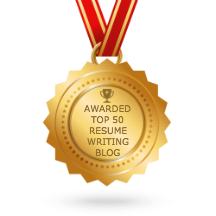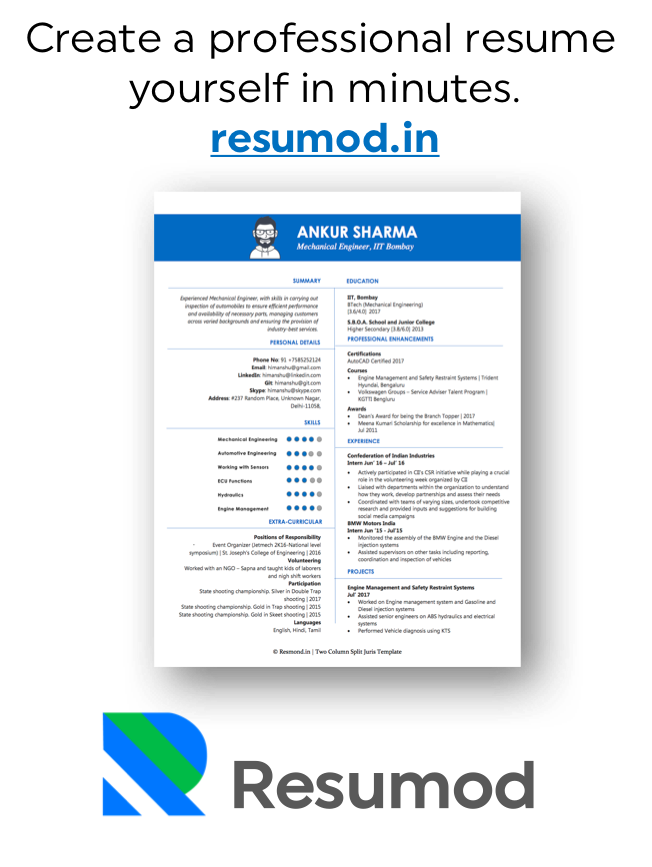For fresh graduates, writing a resume seems tough for two reasons:
- You are new to the Job Market
- You do not have a work history and hence no experience or roles to boast
Both these reasons are valid and can throw any fresher off-guard when writing their first formal resume for an employer. However, this can be easily tackled if you can answer this very basic question – what would you like to include in your first Resume?
Now before we answer this, we first need to answer the question – why do employers want resumes? Employers want resume as it gives them an insight about an individual’s qualifications and skills so that they can evaluate these with respect to the company’s area of work and hire people accordingly.
Now, established companies are always on the lookout for people who already have a work experience. But that does not mean fresher’s are not welcome. Because fresh graduates carry a lot of skills and drive to work and at the same time are available at a low cost, every company is open to hiring fresher candidates with relevant skills and aptitude. This is the area which a fresher’s resume should always address. Hence, the main ingredient of your resume needs to be relevant skills for the employer.
Now let us tackle the first question. The question – what to include in your first resume generally consists of two parts
- What to write in the resume when there is hardly any information!
- How to present it?
The answer to the first question is that there is already a lot of information at your disposal! Throughout your academic career you are involved in reading a lot of books and gaining a lot of knowledge. All you need to now do is, take out all the relevant things that you have learnt so far and put them on paper. In addition, you probably have taken part in a lot of co-curricular (related to your curriculum) and extra-curricular activities. Make a list of such activities. And also make a list of all the relevant subjects which you have studied and can help you in the job that you are pursuing. Create a detailed list & summary of the projects that you have done in your academic career. In addition to this, you will always have your educational credentials, certifications, trainings to talk about. All this is a lot of information!
Now the real pain is – how to present all this. One presentation that can help in this regard is this – http://www.slideshare.net/rajatvashishta/write-a-cracker-resumecv-for-your-next-job-application
In addition to this, below are some General Guidelines for formatting fresher Resumes
- Resumes can be one or two pages but for first resume of your life it should be confined to one page.
- Keeping a standard language font such as Times New Roman or Arial with font size 11 will be perfect. Along with these you should not use any graphics
- Keep margins 0.6″ to 1″; for the body of the resume
- Italics, underlining, shading and sometimes bolding can be an issue as these do not always look the same on other operating systems and/or printers
- Create a “reader-friendly” document that uses white space effectively
- Before applying for any open vacancy from an employer we should research about employer requirements and highlight your qualifications that match their requirements
- Proofread your resume for grammar and spelling mistakes
- A strong recommendation to eliminate graphics as it can give chance to technical problems while scanning your resume or with employers receiving them.
Assess Your Skills: Although you cannot race with skills that involve experience in the job market, but if you are dedicated enough, you can compete with the skills that you already possess. Make a list of all the skills you have developed over your academic career with emphasis on what your prospective employer is looking for. Highlighting skills and knowledge acquired may help to come close with the kind of job you are opting in for.
Format Contact Information
- You should highlight your name a few font sizes larger than other information so that it stands out
- Include mailing address, mobile number and a professional e-mail
- Ensure you have full control to e-mail and phone numbers mentioned in the resume
- Use between two and four lines for contact information
- Centre or left justify
Consider showing your experience as paid, unpaid, or volunteer:
- Including your paid and unpaid or volunteer experience will give an edge over completely fresher people.
- Arrange your experiences (if any) in reverse chronological order within each section
- Most important is to begin each point with an action verb
- Within the experience descriptions, place the most relevant and important tasks or accomplishments first
Finally, sell yourself by making a catalogue of your skills as well as by including quantifiable parameters in your resume such as your ranking in the department, a revenue figure for any fest that you organized and the likes.
As we mentioned earlier too, when writing your first resume never try to make it longer than a page; employers aren’t expecting an extended work history from a fresher and a single page resume creates a lot of positive impact in the face of the employer.
Hope we have given you enough inputs. All the best! 🙂




Way cool! Some very valid points! I appreciate you writing
this article plus the rest of the website is extremely good.
Great Tips ! This site is very helpful for me and other fresher students who are looking for job. It’s actually a great and helpful piece of information. I am satisfied that you simply shared this helpful resume writing tips with us.I was seeking this particular information for a very long time. Thank you and good luck. Please stay us informed like this.Thank you for sharing great content.
Great article..!!
I am a fresher and applying for the job.Your article was helpful for me to create my CV without any problem..
Thank You for posting..!!